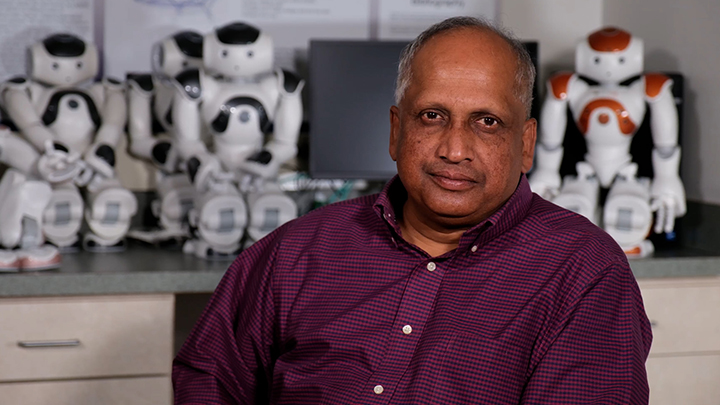Artificial intelligence is transforming the way the world works — and Slippery Rock University is ensuring its graduates are ready to lead that transformation. Few people understand AI and how students can leverage this emerging technology in their careers like Sam Thangiah, SRU professor of computing and security and director of the University’s Artificial Intelligence and Robotics Lab.
A member of the SRU faculty for 35 years, Thangiah has helped prepare students to understand AI and use tools and implement systems for decades, dating back to when SRU first offered an elective course on AI in 1991.
Today, the Artificial Intelligence and Machine Learning courses are required for computing and data analytics majors at SRU, but all students are encouraged to take them as electives. Additionally, professors at SRU in disciplines ranging from accounting to health care professions are incorporating AI concepts into their classes as the technology continues to influence the way professionals in a broad array of fields are performing daily tasks.
Thangiah said that most people think of ChatGPT when the topic of AI in the workplace comes up. Large language models like ChatGPT are what Thangiah calls “a dynamic encyclopedia of information” with specific inputs. But, while large language models can learn and adapt like humans, they are just only one small aspect of many other AI models and they are neither creative nor innovative like humans.
“Because of ChatGPT, people assume that AI is just a chatbot, but AI is much broader,” Thangiah said. “AI is best and most often used for solving unstructured problems. Structured problems are when go you through a sequence of steps to solve it, and every time you give it an input, you’ll get the same output. AI is unstructured so that if you give an input, you could end up getting different outputs for the same input. Artificial intelligence algorithms should be capable of learning and adapting.”
Thangiah earned a Ph.D. from North Dakota State University in computer science, specializing in the application of artificial intelligence to operations research problems. In 1993 after joined SRU, he got a National Science Foundation grant to establish and direct the Artificial Intelligence and Robotics Laboratory at SRU. In addition to teaching artificial intelligence courses, Thangiah has been involved with artificial intelligence and robotics research with undergraduate students.
During his time at SRU, Thangiah has become a recognized expert in developing artificial intelligence algorithms to solve complex transportation problems, specifically vehicle routing and scheduling problems that have saved school districts up to 20% on their transportation costs through greater efficiency.
Developing and using AI tools isn’t just for computer science experts like Thangiah. They are part of a college education today because of their undeniable place in the jobs of tomorrow.
“AI isn’t just for coders or computing majors,” Thangiah said. “It’s impacting a large number of majors and professions.”
Examples include the banking industry using AI for detecting and preventing fraud and doctors using AI to read X-rays and scans to identify and diagnose health problems that they might have missed previously. One of the recent milestones in medical science involves protein folding, which is the process by which a protein chain twists into its correct 3-D shape so it can work properly. This application is important because misfolding can cause diseases like Alzheimer’s, Parkinson’s, and cystic fibrosis.
“Protein folding was supposed to be the most complex problem there is,” Thangiah said. “People had been using supercomputers for decades trying to figure out how protein folding works until a company called DeepMind that is part of Google was able to crack it.”
Few people will be solving complex problems like protein folding, but nearly everyone in the workforce will be affected by AI, if they haven’t been already.
“AI is going to have a large impact on the workforce, because any job that is repetitive in nature is most probably going to get replaced by AI,” Thangiah said. “Everything from manufacturing to customer service, even to point to where there will be robots flipping burgers.”
That doesn’t mean opportunities are disappearing. Instead, they’re shifting toward higher-level work that requires creativity, critical thinking and the ability to build and manage intelligent systems. SRU’s curriculum reflects that reality by embedding AI methods and models into computer science, cybersecurity, information technology, and data analytics courses.
“Employers want graduates who can communicate, collaborate and innovate; it’s not just about knowing the theory,” Thangiah said. “Here at SRU, our students are learning how to implement AI models, work in teams and present their solutions. These are skills that make them stand out to companies looking for more than just academic knowledge.”
More information about computing and security programs at SRU is available on the department’s webpage.
